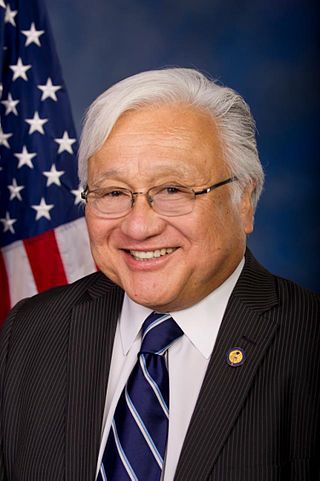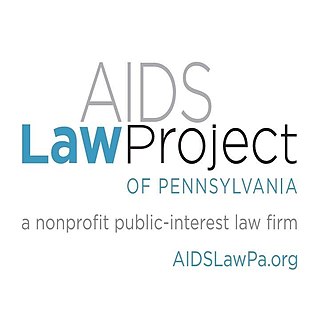
Michael Makoto Honda is an American politician and former educator. A member of the Democratic Party, he served in Congress from 2001 to 2017.
The Employment Non-Discrimination Act (ENDA) is legislation proposed in the United States Congress that would prohibit discrimination in hiring and employment on the basis of sexual orientation or, depending on the version of the bill, gender identity, by employers with at least 15 employees.
Criminal transmission of HIV is the intentional or reckless infection of a person with the human immunodeficiency virus (HIV). This is often conflated, in laws and in discussion, with criminal exposure to HIV, which does not require the transmission of the virus and often, as in the cases of spitting and biting, does not include a realistic means of transmission. Some countries or jurisdictions, including some areas of the U.S., have enacted laws expressly to criminalize HIV transmission or exposure, charging those accused with criminal transmission of HIV. Other countries charge the accused under existing laws with such crimes as murder, manslaughter, attempted murder, assault or fraud.

Lesbian, gay, bisexual, and transgender (LGBT) rights in the United States are among the most advanced in the world, with public opinion and jurisprudence changing significantly since the late 1980s.

The Uniting American Families Act is a U.S. bill to amend the Immigration and Nationality Act of 1952 to eliminate discrimination in immigration by permitting permanent partners of United States citizens and of lawful permanent residents to obtain lawful permanent resident status in the same manner as spouses of citizens and of lawful permanent residents and to penalize immigration fraud in connection with permanent partnerships. If the partnership ends within two years, the sponsored partner's immigrant status would be subject to review.
The Military Readiness Enhancement Act was a bill introduced in the U.S. House of Representatives in several sessions between 2005 and 2009. It would have amended title 10, United States Code to include a policy of nondiscrimination on the basis of sexual orientation, replacing the policy known as "Don't ask, don't tell" (DADT), which banned disclosing one's homosexuality while serving in the Armed Forces.
The Federal government of the United States requires certain non-governmental organizations (NGOs) that receive federal anti-HIV/AIDS or anti-trafficking funds to adopt an organization-wide policy opposing prostitution and sex-trafficking. This requirement, known as the anti-prostitution pledge, has been in place since 2003.

Toonen v. Australia was a landmark human rights complaint brought before the United Nations Human Rights Committee (UNHRC) by Tasmanian resident Nicholas Toonen in 1994. The case resulted in the repeal of Australia's last sodomy laws when the Committee held that sexual orientation was included in the antidiscrimination provisions as a protected status under the International Covenant on Civil and Political Rights (ICCPR).

Lesbian, gay, bisexual, transgender and queer (LGBTQ) people face difficulties in prison such as increased vulnerability to sexual assault, other kinds of violence, and trouble accessing necessary medical care. While much of the available data on LGBTQ inmates comes from the United States, Amnesty International maintains records of known incidents internationally in which LGBTQ prisoners and those perceived to be lesbian, gay, bisexual or transgender have suffered torture, ill-treatment and violence at the hands of fellow inmates as well as prison officials.

Lesbian, gay, bisexual, and transgender (LGBT) rights in Queensland have advanced significantly from the late 20th century onwards, in line with progress on LGBT rights in Australia nationally. 2019 polling on gay rights consistently showed that even in regional areas, Queensland is no more conservative about the subject than any other states.
The HIV Prevention Act of 1997 was proposed U.S. legislation that was not acted on by either house of Congress.
The hate speech laws in Australia give redress to someone who is the victim of discrimination, vilification or injury on grounds that differ from one jurisdiction to another. All Australian jurisdictions give redress when a person is victimised on account of skin colour, ethnicity, national origin or race. Some jurisdictions also give redress when a person is victimised on account of religion, disability, gender identity, HIV/AIDS status or sexual orientation.
The criminal transmission of HIV in the United States varies among jurisdictions. More than thirty of the fifty U.S. states have prosecuted HIV-positive individuals for exposing another person to HIV. State laws criminalize different behaviors and assign different penalties. While pinpointing who infected whom is scientifically impossible, a person diagnosed with HIV who is accused of infecting another while engaging in sexual intercourse is, in many jurisdictions, automatically committing a crime. A person donating HIV-infected organs, tissues, and blood can be prosecuted for transmitting the virus. Spitting or transmitting HIV-infected bodily fluids is a criminal offense in some states, particularly if the target is a prison guard. Some states treat the transmission of HIV, depending upon a variety of factors, as a felony and others as a misdemeanor.

The Ending Federal Marijuana Prohibition Act is a series of federal marijuana decriminalization bills that have been introduced multiple times in the United States Congress.

The HIV Organ Policy Equity Act is a law that modifies rules regarding organ donation between HIV-positive individuals. The law authorizes clinical research and the revision of rules about organ donation and transportation as a result of the research. Organs from HIV donors would only be going to individuals who are already HIV positive, but could lead to 600 additional organ transplants a year. The use of HIV-positive organs was previously a federal crime. This bill passed the United States Senate during the 113th United States Congress, and also passed the United States House of Representatives. It was signed into law as PL 113-51 by President Barack Obama on November 21, 2013.

The Stop Exploitation Through Trafficking Act of 2013 (SETT) is a bill that would require each state, within three years, to have in effect legislation that: (1) treats a minor who has engaged or attempted to engage in a commercial sex act as a victim of a severe form of trafficking in persons, (2) discourages the charging or prosecution of such an individual for a prostitution or sex trafficking offense, and (3) encourages the diversion of such individual to child protection services.

The Lawsuit Abuse Reduction Act of 2015 is legislation that amends Rule 11 of the Federal Rules of Civil Procedure to require judges to impose mandatory sanctions on attorneys, law firms, or parties who file frivolous "claims, defenses, and other legal contentions." The legislation replaces the current rule, which allows judges' discretion to impose sanctions, and instead forces judges to impose mandatory sanctions prescribed by Congress. It also removes the rule's safe harbor protection, which currently allows attorneys to correct their pleadings, claims or contentions within a 21-day period without fear of sanctions.

The AIDS Law Project of Pennsylvania is a nonprofit, public-interest law firm that provides free legal service to individuals living with and affected by HIV and AIDS. Founded in 1988, it is the only public interest law firm in the nation that is exclusively dedicated to helping those with HIV and AIDS. AIDS Law Project is headquartered in Philadelphia with an additional office in Southern New Jersey.
House Resolution 2796 is a bill in the United States House of Representatives that was introduced on June 7, 2017, by Representative Pete Olson [R-TX-22] and originally cosponsored by Reps. Brian Babin [R-TX-36], Ralph Lee Abraham [R-LA-5], and Vicky Hartzler [R-MO-4]. The proposed legislation would prohibit the interpretation of the word "sex" or "gender" to include "gender identity," and would require the terms "man" or "woman" to refer exclusively to a person's biologically assigned gender in the interpretation of federal civil rights laws, federal administrative agency regulations, and federal guidance. The bill has attracted five additional cosponsors since its introduction.
The Strengthening the Tenth Amendment Through Entrusting States (STATES) Act was a bill proposed in the 115th United States Congress that would recognize legalization of cannabis and the U.S. state laws that have legalized it through their legislatures or citizen initiative. It was introduced on June 7, 2018, by Senators Cory Gardner and Elizabeth Warren. A companion bill was introduced the same day in the House of Representatives, sponsored by Earl Blumenauer and David Joyce. The act would amend the Controlled Substances Act of 1970 to exempt from federal enforcement individuals or corporations in states who are in compliance with U.S. state, U.S. territory and the District of Columbia, or tribal law on cannabis, with certain additional provisions such as minimum ages. The banking provisions of the STATES Act have been reintroduced as the Secure and Fair Enforcement (SAFE) Banking Act of 2019 in the 116th U.S. Congress by Ed Perlmutter in the House, and by Jeff Merkley in the Senate. As of September 18, 2019, the House bill had 206 cosponsors, and the Senate bill had 33 cosponsors.






